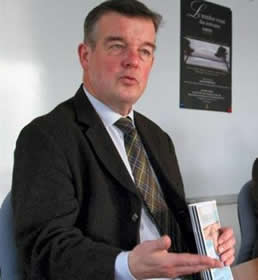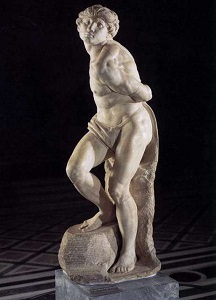De Colombiaanse schrijver Gabriel García Márquez werd op 6 maart 1928 in de kustplaats Aracataca geboren. Zie ook alle tags voor Gabriel García Márquez op dit blog.
Uit: Memories of My Melancholy Whores (Vertaald door Edith Grossman)
“The year I turned ninety, I wanted to give myself the gift of a night of wild love with an adolescent virgin. I thought of Rosa Cabarcas, the owner of an illicit house who would inform her good clients when she had a new girl available. I never succumbed to that or to any of her many other lewd temptations, but she did not believe in the purity of my principles. Morality, too, is a question of time, she would say with a malevolent smile, you’ll see. She was a little younger than I, and I hadn’t heard anything about her for so many years that she very well might have died. But after the first ring I recognized the voice on the phone, and with no preambles I fired at her:
“Today’s the day.”
She sighed: Ah, my sad scholar, you disappear for twenty years and come back only to ask for the impossible. She regained mastery of her art at once and offered me half a dozen delectable options, but all of them, to be frank, were used. I said no, insisting the girl had to be a virgin and available that very night. She asked in alarm: What are you trying to prove? Nothing, I replied, wounded to the core, I know very well what I can and cannot do. Unmoved, she said that scholars may know it all, but they don’t know everything: The only Virgos left in the world are people like you who were born in August. Why didn’t you give me more time? Inspiration gives no warnings, I said. But perhaps it can wait, she said, always more knowledgeable than any man, and she asked for just two days to make a thorough investigation of the market. I replied in all seriousness that in an affair such as this, at my age, each hour is like a year. Then it can’t be done, she said without the slightest doubt, but it doesn’t matter, it’s more exciting this way, what the hell, I’ll call you in an hour.
I don’t have to say it because people can see it from leagues away: I’m ugly, shy, and anachronistic. But by dint of not wanting to be those things I have pretended to be just the opposite. Until today, when I have resolved to tell of my own free will just what I’m like, if only to ease my conscience. I have begun with my unusual call to Rosa Cabarcas because, seen from the vantage point of today, that was the beginning of a new life at an age when most mortals have already died.”

Gabriel García Márquez (Aracataca, 6 maart 1928)
De Duitse dichter en schrijver Günter Kunert werd geboren op 6 maart 1929 in Berlijn. Zie ook alle tags voor Günter Kunert op dit blog.
Ikarus
Es sind ein paar Federn geblieben
nach seinem tiefen Sturz.
Höhenflüge dauern eben kurz
und werden zur Warnung beschrieben
gegen Übermütigkeiten. Doch die Geschichte
behält Gestalten des Scheiterns im Sinn.
In Clios Hauptbuch verzeichnet Gewinn
die dürftigsten Berichte.
Der Untergang als letzter Akt
ist dem Vergessen entzogen.
Und steigt aus des Alltags Katarakt
wie ein seltsamer Regenbogen.
Neue Geologie
Kriechen in tiefste Gräben
bis zum Magma hinab.
Nächte, die nie mehr enden,
nie zum Tag sich wenden,
im basaltgesicherten Grab.
Fliegen zu den Planeten
und weiter hinaus in den Raum.
Betreten doch keinmal die Sterne
in unbarmherziger Ferne,
ungreifbar wie aller Traum.
Leiden an fremden Leiden,
wie es uns glaubhaft schien.
Kleiden und nähren die Armen
durch simuliertes Erbarmen –
ein Abschied von Utopien.
Vergehen im sinnlosen Treiben,
versinken in Meeren von Gift.
Bleiben von dieser Erde,
im Reigen des Stirb und Werde,
kann nichts, was uns betrifft.

Günter Kunert (Berlijn, 6 maart 1929)
De Surinaamse schrijver Clark Accord werd op 6 maart 1961 geboren in de Surinaamse hoofdstad Paramaribo. Zie ook alle tags voor Clark Accord op dit blog.
Uit: Tussen Apoera en Oreala
“Ze heten Sathobang en Kolâsji, die twee blauwe kikkers op het blad. Ze wonen in het regenwoud in de omgeving van Oreala. Wat je ziet is een onderdeel van het paringsritueel. Laat je geen zand in de ogen strooien door hun houding. Alhoewel het vrouwtje haar rug naar het mannetje heeft toegekeerd, houden ze zielsveel van elkaar. Dat is haar manier om zijn lust op te wekken. ….Maar dat is een lang verhaal. Een verhaal over de liefde. Ze houden zoveel van elkaar dat ze elkaar het leven onmogelijk maken. Maar het komt uiteindelijk toch nog goed met hen.”
(…)
Op Lokobja’s hoofd prijkte de van arendveren gemaakte tooi, het symbool van de Hariwari, ten teken dat hij een groot tokotsji was, de machtige priester van de Arowak en tevens boodschapper van Adjali, die als enige levend deze wereld had verlaten.
(…)
“Sathobang lag rustig in de hangmat te slapen. Die ochtend had ze het kind bij een min laten zogen, waardoor haar borsten als overrijpe broodvruchten vooruit stonden, klaar om bij de geringste aanraking hun witte vruchtsap naar buiten te persen. Als een fijnmazig netwerk waren de blauwe aderen onder haar huid zichtbaar. Niets aan haar gelaatsuidrukking deed vermoeden dat ze last had van de stuwing van haar borsten.”

Clark Accord (6 maart 1961 – 11 mei 2011)
De Engelse dichteres Elizabeth Barrett Browning werd op 6 maart 1806 geboren in Durham, Engeland. Zie ook alle tags voor Elizabeth Barrett Browning op dit blog.
De Profundis
I
The face, which, duly as the sun,
Rose up for me with life begun,
To mark all bright hours of the day
With hourly love, is dimmed away—
And yet my days go on, go on.
II
The tongue which, like a stream, could run
Smooth music from the roughest stone,
And every morning with ‘ Good day’
Make each day good, is hushed away,
And yet my days go on, go on.
III
The heart which, like a staff, was one
For mine to lean and rest upon,
The strongest on the longest day
With steadfast love, is caught away,
And yet my days go on, go on.
IV
And cold before my summer’s done,
And deaf in Nature’s general tune,
And fallen too low for special fear,
And here, with hope no longer here,
While the tears drop, my days go on.

Elizabeth Barrett Browning (6 maart 1806 – 29 juni 1861)
Portret door Sir William Charles Ross, z.j.
De Franse schrijver Stéphane Hoffmann werd geboren op 6 maart 1958 in Saint-Nazaire. Zie ook alle tags voor Stéphane Hoffmann op dit blog.
Uit: Des garçons qui tremblent
„Son mari, c’est Armand-Pierre. Armand-Pierre Foucher. Habit gris souris, gilet gris perle, bleuet. Empesé. Ridicule et froid. Il me regarde à peine. Sait-il que Camille a passé la nuit chez moi ? Il m’avait à la bonne, pourtant, il y a quelques mois. En attendant sa fiancée, il fait des mines aux mémères. Les pépères lui tapent dans le dos, comme s’il venait de marquer un but. Pas encore, les gars, peut-être ce soir. Sa mère se dandine. Son chapeau l’empêche d’embrasser, c’est exprès. Elle a son air supérieur. C’est la mère supérieure, sous son abat-jour. Toutes les filles sont moches. Par politesse, je suppose, pour laisser la beauté à la mariée, qui est en retard, on dit qu’elle a pleuré. Dès qu’Armand-Pierre me voit, dans mon costume qui penche et mes souliers qui couinent, il a son rictus. Cet air méprisant que je connais si bien. Cet air qui vous envoie en exil. Je soutiens son regard. Je t’emmerde, Armand-Pierre Fou-cher, petit combinard de mes deux. Amen. Laus tibi, Domine, Rex aeternae gloriae.
C’est pas moi qui dis ça, c’est le prêtre. Un drôle de zig. Il n’est pas habillé comme un curé de chez nous. Un curé de chez nous a, sur les épaules, comme une nappe ronde avec, au milieu, un trou dans lequel il passe la tête. Ça s’appelle une chasuble et ça change de couleur selon les saisons. Des fois vert, des fois rouge, des fois violet. Il paraît que ça a un sens, mais moi je n’en trouve aucun, je n’y crois pas et je me mets à faire la messe buissonnière, parce que je dessèche d’ennui à leurs messes et que l’ennui, c’est l’enfer. Ce curé ne porte pas une nappe, mais comme un tapis brodé.“

Stéphane Hoffmann (Saint-Nazaire, 6 maart 1958)
De Italiaanse beeldhouwer, schilder, architect en dichter Michelangelo werd geboren op 6 maart 1475 in Caprese. Zie ook alle tags voor Michelangelo op dit blog.
Love’s Justification
YES! hope may with my strong desire keep pace,
And I be undeluded, unbetrayed:
For if of our affections none find grace
In sight of Heaven, then wherefore hath God made
The world which we inhabit? Better plea
Love cannot have, than that in loving thee
Glory to that eternal peace is paid,
Who such divinity to thee imparts
As hallows and makes pure all gentle hearts.
His hope is treacherous only whose love dies
With beauty, which is varying every hour;
But, in chaste hearts uninfluenced by the power
Of outward change, there blooms a deathless flower,
That breathes on earth the air of paradise.
Vertaald door William Wordsworth

Michelangelo (6 maart 1475 – 18 februari 1564)
Opstandige slaaf door Michelangelo, 1513 (Louvre, Parijs)
De Japanse schrijver Teru Miyamoto werd geboren op 6 maart 1947 in Kobe. Zie ook alle tags voor Tery Miyamoto op dit blog.
Uit: Kinshu: Autumn Brocade (Vertaald door Roger K Thomas)
“Yamagata was cloudy. Feeling somewhat disappointed, I sat in the cab from Yamagata Station to Zaô. Hot Spring and looked up at the sky. Suddenly I realized this was the second time I had visited this northeastern region. I remembered setting out for Towada from Lake Tazawa in Akita Prefecture on our honeymoon. Kiyotaka and I stayed at the inn in the hot spring resort. The strong smell of sulfur made it difficult to breathe, and the overflowing hot water was running down channels on both sides of the street. Clouds covered the night sky, without a sliver of moon or any stars visible, but the mountain air was bracing. For the first time my son and I were on a trip, and we were in a buoyant mood. The next morning it was clear. Holding his crutches in front of him, Kiyotaka didn’t want to waste a minute getting to the gondola, so immediately after breakfast we set off for the gondola platform in the dahlia garden. To think that we should board the same gondola halfway up Mount Zaô at the same time as you-one of countless gondolas going up and down the mountain in such an out-of-the-way place as Yamagata! It sends a shiver down my spine just to think about such a coincidence. Several groups of people were waiting to get on the lift, but after two or three minutes we boarded. The attendant opened the gondola door, lifted Kiyotaka and his crutches, and set him inside. Then I got on. I heard the attendant announce that he could take one more, and a man in a light brown coat boarded the cramped gondola and sat down opposite us. The door closed, and the moment the lift lurched forward I realized it was you.”

Teru Miyamoto (Kobe, 6 maart 1947)
Zie voor nog meer schrijvers van de 6e maart ook mijn blog van 6 maart 2012 deel 2.
